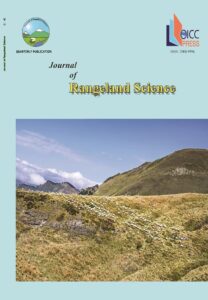Studying the Vegetation Changes of Natural Rangelands in Inche Shorezar of Agh Ghala, North Golestan Province, Iran
Authors
Abstract
Studies on vegetation changes of rangelands under grazed and non-grazed
conditions are of great importance in the range management planning programs. To determine
the change process of vegetation, this study was performed in Inche Shorezar site of Golestan
province for nine years (1997-2005). The vegetation parameters were measured every year in
several fixed plots inside and adjacent of exclosures. The canopy cover of each species was
estimated in each plot. Forage production was randomly measured on one meter square plots
in each year using the clipping and weighing method. Correlations between canopy cover of
species and growth forms with the rainfall of different months and periods were calculated
using SPSS software. Results showed that total canopy cover in 2005 was significantly higher
than 1997 both inside and adjacent of exclosures which has been mainly related to increased
annual plant cover but the perennial canopy cover was decreased in these years. Perennial
species of (class I) did not grow inside the fixed plots. Cover of increasers (class II) species
was reduced from the first year to the final one for both inside and adjacent of exclosures.
However, the cover of (class III) species in the final year was not significantly increased than
that for the first year. Forage production generally was higher inside than adjacent of
exclosures. Litter increased during the study period for both inside and adjacent. Litter was
significantly higher inside of exclosures than adjacent in 2005. Although the plant canopy
cover was affected by rainfall but correlation coefficient was statistically significant only for
total, annual and some perennial canopy cover species. Although total and annual cover was
high inside and adjacent of exclosures in 2005, the cover of perennials was decreased. By the
reduction of palatable species, unpalatable species were increased inside and adjacent.
Although by increasing the plant cover, the range condition was relatively improved, this
improvement was achieved by the increase in the annuals instead of perennials. It was
concluded that the exclosure cannot be used as a range improvement method to improve these
rangelands’ conditions. For the rehabilitation of these areas, human interference is necessary.


